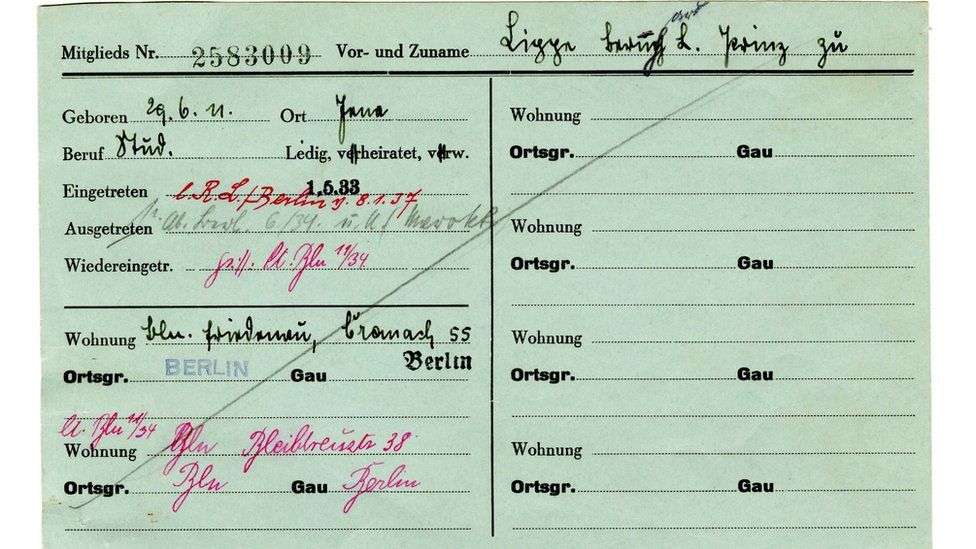Nazi card proves Dutch Prince Bernhard joined Hitler's party
- Published

The Dutch government has confirmed the authenticity of a Nazi party card held by Prince Bernhard, prince consort for decades after World War Two.
A former head of the palace archives, Flip Maarschalkerweerd, said he found the card while going through the prince's things after his death.
Bernhard, a German aristocrat, repeatedly denied being a member of Adolf Hitler's NSDAP political party.
However, historians gave little credence to his denials.
In 1996, a researcher at the Dutch institute for war studies (Niod) said he had found a copy of the card in a US university archive.
Gerard Aalders, who was widely criticised at the time for his revelation, said on social media that "Prince Bernhard lied to the bitter end about his Nazi past".
Bernhard von Lippe-Biesterfeld had married Dutch Princess Juliana in 1937 and escorted the Dutch royal family in exile when war broke out in 1940.
But he was never trusted by British security services, despite taking part in a Dutch royal broadcast via the BBC in 1943 and being put in charge of the unified Dutch resistance forces in 1944. He was even decorated for his role as a wartime RAF pilot.
When Juliana became queen in 1948, Bernhard became prince consort.
Bernhard went to his grave swearing he had never been a paid-up member of Hitler's party. "I can declare with my hand on the bible: I was never a Nazi," he said in an interview published (in Dutch) after his death in 2004.
He had admitted to being a prospective member of two Nazi organisations as a student for a time after 1933 - the Sturmabteilung security service and the Schutzstaffel (SS) - but he argued in 1971 that "at the start you had to take part a little in one way or another", because if they had found out he was opposed, it would have been tricky to pass university exams.
That was far different from being a voluntary, card-carrying member of Hitler's political party from 1933 to 1936 and holding on to the card until his death.
As well as a copy of the card showing up in the US in the 1990s, in 2010 historian Annejet van der Zijl found the prince's student membership card in a German archive that also noted he had been a party member since 27 April 1933.
Flip Maarschalkerweerd says he stumbled on the prince's NSDAP membership card while carrying out an inventory of the prince's archives when he died.
He told NRC Handelsblad newspaper that he also came across a note dating back to 1949 from a US military administrator in Germany called Lucius Clay, who wrote to the prince that he had been about to destroy the card, but then decided "you have earned the right to destroy it yourself".
Journalist Jan Tromp, who interviewed the prince in depth over several years, said that the revelation was not a surprise, but it would come as a shock and a betrayal to those who had taken part in the Dutch resistance and had commemorated the liberation with the prince for years afterwards.
Tromp believed that the prince's lie had eventually turned into self-deception.
"For the prince, there was no other choice but to deny he was a member of the enemy club - a club that had destroyed the country and sent people to concentration camps," he told De Volkskrant newspaper.
Hours after an image of the membership card appeared in Dutch media, the royal house confirmed the card's existence and published a picture of it. In a statement, it said King Willem-Alexander attached great importance to independent research and knowledge of the past.
"[The king] is aware of the role and position of the House of Orange-Nassau in the history of the kingdom," it added.
Several political parties and Jewish groups called on caretaker Prime Minister Mark Rutte to launch an investigation.
Naomi Mestrum, of the Israel Information and Documentation Centre (Cidi), said that proof of the prince's Nazi past added another "black page to a painful part of recent Dutch history".
Mr Rutte said that while it was an awful development, previous research had made it quite convincingly clear that the prince had been a Nazi party member.
Related Topics
- Published30 April 2019
- Published31 March 2015
- Published2 December 2004
- Published2 December 2004